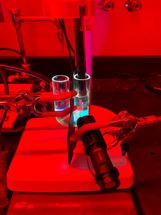Biotec Pharmacon enters Phase III with diabetic ulcers indication
Biotec Pharmacon has during the past several months cooperated with and obtained scientific advice from the European Medicines Agency (EMEA) regarding the clinical development program for SBG for treatment of diabetic ulcers. Biotec Pharmacon has completed clinical phase II studies within the diabetic ulcers indication, and has recently initiated a new study in the UK. EMEA has now confirmed that the company may be in a position to file for marketing authorisation based on two positive, confirmatory phase III studies, of which the ongoing study in the UK will qualify as one of these. The size of the second study will be approximately of the same size as the current UK study, and both studies may be conducted in parallel.
The scientific advice from EMEA is very positive for Biotec Pharmacon since it implies that time and costs associated with a marketing authorisation application for SBG within the diabetic ulcer indication may be reduced compared to earlier estimates. Biotec Pharmacon maintains an optimistic objective to file for marketing authorisation in Europe during 2009. A similar process is being planned with FDA for the US market.
The Board of Directors has not yet decided whether the company shall complete the final phase of the clinical development program by its own. Value creation potential, competence and capacity as well as capital requirements will be important factors to consider in this respect.
Biotec Pharmacon's concept for treatment of wounds is based on the company's pharmaceutical compound SBG which acts on immune cells in the skin to support healing of ulcers. Diabetic patients often suffer from foot and leg ulcers due to dysfunctional immune cells in the skin. SBG stimulates and activates these immune cells in such a way that new tissue develops. Chronic ulcers among diabetic patients represent a severe medical problem.
Organizations
Other news from the department research and development

Get the chemical industry in your inbox
By submitting this form you agree that LUMITOS AG will send you the newsletter(s) selected above by email. Your data will not be passed on to third parties. Your data will be stored and processed in accordance with our data protection regulations. LUMITOS may contact you by email for the purpose of advertising or market and opinion surveys. You can revoke your consent at any time without giving reasons to LUMITOS AG, Ernst-Augustin-Str. 2, 12489 Berlin, Germany or by e-mail at revoke@lumitos.com with effect for the future. In addition, each email contains a link to unsubscribe from the corresponding newsletter.




























































